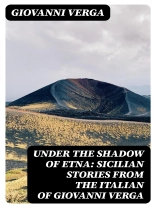In ‘Under the Shadow of Etna: Sicilian Stories from the Italian of Giovanni Verga, ‘ the reader is immersed in a vivid tapestry of Sicilian life, where the influence of the majestic Mount Etna looms large over the struggles and aspirations of its inhabitants. Verga’s literary style is characterized by his use of Verismo, a form of realism that emphasizes the gritty realities of life, infused with emotional depth and a profound sense of place. The collection showcases a variety of narratives that depict the hardships faced by rural Sicilians, illuminating themes of poverty, love, and the unyielding nature of fate, all steeped in the rich cultural milieu of 19th-century Italy. Giovanni Verga, one of Italy’s most significant writers of the late 19th century, draws deeply from his Sicilian heritage, a backdrop that profoundly influences his portrayal of local customs and societal structures. Born in Catania, his firsthand observations of the peasant class and their struggles inform the stories within this collection. Verga’s commitment to authentic representation and the exploration of human emotions positions him as a pioneering figure in the movement toward modern realism in literature. This collection is highly recommended for readers interested in exploring the intricate dynamics of Sicilian culture through masterful storytelling. Verga’s ability to evoke empathy and understanding for his characters makes these tales not just narratives, but essential insights into the human condition. Engage with these stories to appreciate the timeless struggles and resilience of the Sicilian spirit.
Про автора
Giovanni Verga (1840-1922) stands as a towering figure in Italian literature and is renowned for his significant contributions to the verismo (realism) movement. Born in Catania, Sicily, Verga’s works often reflect the harsh realities of life in rural Southern Italy during the 19th century. His experiences growing up in the shadow of Mount Etna, among the complexities of Sicilian society, profoundly influenced his writing. Verga’s narrative style is characterized by an objective and non-judgmental perspective, allowing the stark lives of his characters to speak for themselves and to underscore his social commentary. One of his most notable collections, ‘Under the Shadow of Etna: Sicilian Stories from the Italian of Giovanni Verga’ (1886), exemplifies his masterful use of regional dialects and his deep understanding of Sicilian culture. Verga’s profound empathy for the struggles of the common people and his exceptional ability to depict their lives with authenticity are evident throughout his oeuvre. His dedication to craft and his keen eye for detail mark Verga as a pioneer in the verismo literary tradition, a style that aimed to depict the everyday lives of people with unvarnished truth, thus paving the way for future generations of realist writers.












